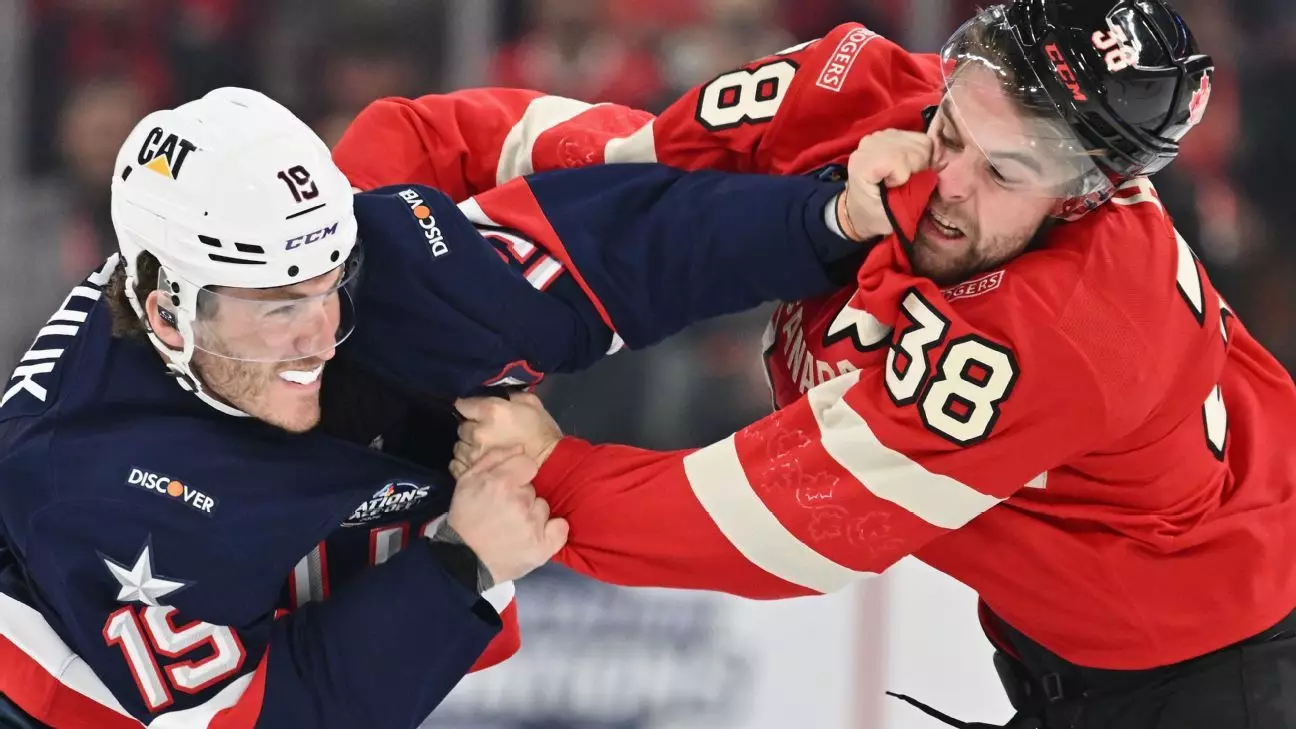In the vibrant city of Boston, a monumental clash unfolded that signified not just a game of hockey, but a defining moment for the sport itself. The NHL 4 Nations Face-Off witnessed a thrilling encounter between Team USA and Canada, culminating in a 3-1 victory for the Americans. While the Canadian side, led by coach Jon Cooper, expressed disappointment over the result, he could not ignore the larger significance of the match. “The game is in a better place because last night’s game existed,” he acknowledged, emphasizing the impact of such exhilarating encounters on the sport’s growth and popularity.
The significance of this match was underscored by the staggering number of viewers: at its peak, 5.4 million Americans were glued to their screens, captivated by a “best on best” tournament—the first of its kind since 2016. Fans tuned in not only to witness the high-stakes action but also to see elite NHL talent representing their nations. However, the spectacle was magnified by the charged atmosphere that preceded the game, highlighted by Montreal fans voicing their discontent towards U.S. policies, which added a layer of drama before the puck was even dropped.
The energy in the arena surged to unprecedented levels as three fights erupted within a record nine seconds of the initial face-off. Jesper Bratt of Sweden, a spectator of this chaotic scene, remarked, “I knew it was going to be an electric start, but I maybe didn’t expect three fights in the first nine seconds.” Such intensity and emotion displayed by the players highlighted not just the rivalry between two hockey powerhouses but also the personal stakes that come with representing one’s country.
Matthew and Brady Tkachuk, alongside J.T. Miller, took part in these explosive exchanges, setting the tone for a fierce competition. Matthew Tkachuk earned a distinction as the fighter who initiated the fastest fight in NHL international history, eclipsing a record held since 1996. His participation was cut short due to a lower-body injury, leaving many speculating about the implications for upcoming matches, particularly against Sweden. Coach Mike Sullivan’s acknowledgment of Tkachuk’s condition left fans on edge, pondering the impact of this significant player on futures games.
As the dust settled, the discussions around fighting in hockey reignited. Travis Konecny from Team Canada spoke candidly about the nature of the game, asserting, “We’re one of the only sports that still has fighting in it. It’s a war out there.” While some may argue against violence in sports, Konecny’s sentiments echoed the passion that fans and players share for the game. Coach Cooper noted that despite the division surrounding the topic, fighting can serve as a catalyst for escalating intensity, stating, “You can say whatever you want about fighting, but that was what ignited the game.”
This intensity drew in not only die-hard hockey fans but also casual observers, illustrating how international rivalries transcend the sport. Players like Jack Hughes remarked on the explosion of interest following such dramatic encounters, noting that it incited conversations surrounding hockey compared to other sports and their All-Star events. The fervor of a true competition between nations, loaded with emotional stakes and unwavering commitment, was unmistakably superior.
Comparisons to Other Events
U.S. center Vincent Trocheck made a salient point when he highlighted how the 4 Nations tournament effectively replaced the NHL’s traditional All-Star Game. “It’s not comparable to an All-Star game or a Pro Bowl,” he emphasized, underlining the significance of emotion and dedication that characterized the competition. This was a playoff-like atmosphere where each player visibly fought for glory and representation, reminiscent of historic moments in hockey.
Moreover, the reverberations of this game extended beyond just the players on the ice. Coaches like Sam Hallam from Sweden and Finnish player Erik Haula echoed sentiments about the passion displayed throughout the match, recognizing its vital role in promoting the sport globally. This event has the potential to inspire a new generation of players, much like the Miracle on Ice in 1980 stirred hopes and dreams in aspiring athletes across the nation.
As the tournament progresses, with Canada facing elimination against Finland and the U.S. gearing up to take on Sweden, anticipation is building for the final matches. The emotional stakes are high, and the players’ dedication serves as a reminder of the profound impact these competitions can have. As Sullivan aptly noted, “It was an unbelievable celebration of hockey,” suggesting that the influence of events like the 4 Nations can shape the future of the sport immensely.
In a world inundated with fast-paced entertainment, this encounter reaffirmed the significance of traditional sports, reinforcing the notion that when countries clash, the essence of competition comes alive, bringing with it a fervor that resonates deeply within the hearts of players and fans alike. The ramifications of this rivalry will certainly be felt for years to come, potentially inspiring countless young athletes to don their skates and pursue their dreams on the ice.


Leave a Reply